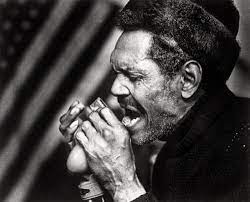Introduction
Big Walter Horton, also known as Walter “Shakey” Horton, was one of the most influential and skilled blues harmonica players in history. Known for his soulful tone, expressive phrasing, and impeccable technique, Horton left an indelible mark on the development of the Chicago blues sound. Despite his quiet demeanor and often underappreciated status during his lifetime, his legacy continues to inspire generations of blues musicians and harmonica players.
Early Life and Musical Beginnings
Walter Horton was born on April 6, 1917, in Horn Lake, Mississippi, though some sources suggest Memphis, Tennessee. He began playing the harmonica at a very young age, reportedly by the age of five. Horton was largely self-taught and developed a deep love for blues music through the influence of local musicians and early Delta blues recordings.
As a teenager, Horton started performing on the streets of Memphis and at parties and juke joints. He became known for his rich, melodic playing and was already developing the distinctive tone and control that would become his trademark.
Career in the 1930s and 1940s
In the 1930s, Horton played with several local bands, including those led by Jack Kelly and the Memphis Jug Band. He also worked with the young guitarist and future blues legend Robert Johnson, though recordings from this period are scarce or non-existent.
Horton made his first known recordings in 1939 under the name “Little Walter” (not to be confused with the later famous Little Walter Jacobs), but those early sessions did not gain much commercial success. He briefly withdrew from performing professionally during the 1940s, possibly due to health problems, disillusionment with the music industry, or the need to work various day jobs to support himself.
Return to Music and Move to Chicago
In the early 1950s, Horton moved to Chicago, which had become the epicenter of the post-war electric blues movement. He was welcomed into a thriving blues scene that included legends like Muddy Waters, Howlin’ Wolf, and Sonny Boy Williamson II.
Horton began recording again, this time as “Big Walter” to distinguish himself from the rising star Little Walter Jacobs. His recordings for labels such as Chess, Sun, and Cobra highlighted his mature, expressive style and earned him a reputation as one of the premier harmonica players in blues music.
Session Work and Collaborations
Though Horton rarely achieved fame as a solo artist, he became a sought-after session musician. His harmonica playing graced many classic blues recordings throughout the 1950s and 1960s. He worked with a who’s who of blues greats, including Muddy Waters, Jimmy Rogers, Otis Rush, Willie Dixon, and Johnny Shines.
One of Horton’s most celebrated performances is on Jimmy Rogers’ “Walking By Myself,” where his harmonica provides a haunting, unforgettable accompaniment. His work with Willie Dixon’s Chicago Blues All Stars and appearances at major blues festivals helped solidify his role as a pillar of the Chicago blues scene.
Later Years and Recognition
In the 1970s, as interest in traditional blues surged among younger audiences, Horton found new opportunities to record and tour, particularly in Europe. He released several solo albums during this time, including Fine Cuts, Walter Horton with Carey Bell, and Big Walter Horton and Shakey Horton.
Despite his immense talent, Horton remained a modest and reserved figure. He struggled with health issues, including complications from chronic alcoholism, which affected his ability to maintain a consistent career. Nevertheless, his stature among musicians only grew with time.
Death and Legacy
Big Walter Horton died on December 8, 1981, in Chicago at the age of 64. He was buried at Restvale Cemetery in Alsip, Illinois—a final resting place for many Chicago blues legends.
Though he never achieved the fame of some of his contemporaries, Horton’s influence on the blues harmonica is immeasurable. His ability to blend subtlety with power, emotion with technique, made him a favorite among fellow musicians and blues aficionados.
Today, Big Walter Horton is celebrated as one of the finest harmonica players in the history of the blues. His recordings continue to be studied and admired by players around the world, and his legacy lives on in the music of those he inspired.
Conclusion
Big Walter Horton may have been a quiet man, but he spoke volumes through his harmonica. From the dusty streets of Memphis to the electric stages of Chicago, his journey is a testament to the enduring power of the blues. For anyone seeking the soul of the harmonica, the music of Big Walter Horton is essential listening.


Comments are closed